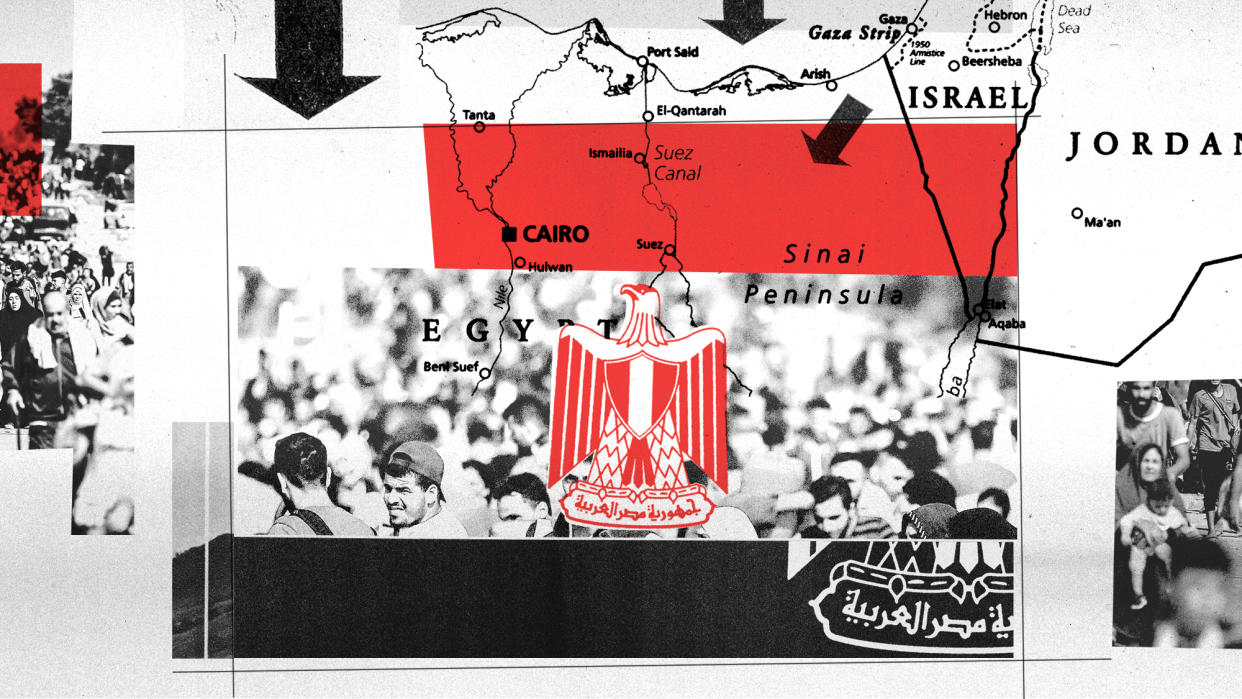Could Gazan refugees 'rupture' Israel's decades-long peace with Egypt?

- Oops!Something went wrong.Please try again later.
As Israeli forces continue to push further into the densely packed Gaza Strip, the sheer scale and ferocity of the Israeli offensive has created a humanitarian crisis of staggering proportions, with a recent United Nations estimate calculating that 85% of the strip's 2.1 million residents have been displaced within the 140 square mile territory over the past two months alone. After initially focusing largely on northern Gaza, the Israeli military's recent push into the southern half of the strip has left Palestinian civilians with even fewer safe havens, prompting more and more refugees to mass at the Rafah border crossing between Gaza and Egypt — the sole access point for aid shipments into, and extremely limited ability to leave the increasingly uninhabitable area.
Throughout this latest spasm of region-shaking violence, Egypt has steadfastly refused to open itself to Palestinian refugees hoping to cross through Rafah and escape Israel's bombardment of Gaza. "Of course we sympathize," Egyptian President Abdel Fattah el-Sisi said in the opening weeks of the war, even as his country continues to resist calls to allow Gazans to enter en masse, going so far as to begin military fortifications at the crossing "reflect[ing] concerns that the border could be breached" by the tens of thousands of refugees desperately congregating on the other side, according to The New York Times. Israel's push into southern Gaza and its overall military campaign "point to attempts to move Palestinians into Egypt," United Nations Relief and Works Agency commissioner general Philippe Lazzarini wrote this weekend in the Los Angeles Times.
As pressure mounts at the Rafah crossing, what could happen next?
What the commentators said
While Egypt and Israel enjoy a nearly half-century-long peace agreement, the prospect of a mass exodus of Palestinian refugees into Egypt's northern Sinai region would prompt a "rupture" between the two nations, multiple U.S. and Israeli officials told Axios. Speaking last week at an Aspen Security conference in Washington, Egyptian Foreign Minister Sameh Shoukry called any potential displacement of Gazans into Egypt "inappropriate and in contradiction of international law." Egyptian State Information Service head Diaa Rashwan has similarly called it "a red line."
Israeli officials have denied an organized attempt to relocate Palestinian refugees into Egypt, with one military spokesperson telling France TV that "there is not, never was and never will be an Israeli plan to move the residents of Gaza to Egypt." In November, Israeli officials had "quietly tried to build international support" to transfer Gazans to Egypt "for the duration of its war in the territory" in what they framed as a "humanitarian initiative," according to The New York Times.
Domestically, Egyptian officials worry that an influx of refugees could destabilize the country's "precarious economic situation" as well as "irreparably damage the struggle for Palestinian statehood," The New York Times reported. As Sisi campaigns for what is a virtually guaranteed third term in office, he has been accused by some critics of being "'complicit' in Israel's killings of civilians" while lauded by others "for what they view as foiling an Israeli scheme to displace Palestinians into Egypt" The Atlantic Council's Shahira Amin said last week.
What next?
If Gazans are indeed pushed into Egypt, or elsewhere, the existing "Palestinian refugee crisis — bad as it is now — could metastasize and worsen, creating predictable lasting global repercussions," Rand Corporation Infrastructure, Immigration, & Security Operations Program director Shelly Culbertson predicted. For Egypt, accepting mass refugees would "have destabilizing implications," and more broadly for Israel, another mass exodus of Palestinian refugees would "further erode" prospects for regional stability with other nations, "including prospects for a normalization agreement between Israel and Saudi Arabia."
Egypt, meanwhile, may ultimately open the Rafah crossing for select Gazan refugees in the coming year, Lebanese newspaper Al-Akhbar reported according to Israel's I24 News. While Egypt's public stance is to remain closed to refugees for now, the government is reportedly looking into an "organized departure process via pre-issued exit permits, highlighting criteria such as health conditions requiring care, humanitarian grounds, and education." The potential softening of its stance on Gazan refugees allegedly stems from concerns that "Israel may hinder Gaza's economic recovery post-conflict" as well as Hamas' effort to "pressure Egypt by inciting Gaza residents to flock to the Rafah crossing."

